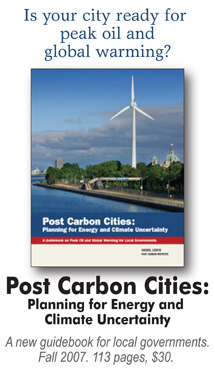Post Carbon Cities: Planning for Energy and Climate Uncertainty
 Portland, USA (CNW) - Record-setting prices for oil are creating huge problems for America’s cities as they cope with soaring fuel costs. In Post Carbon Cities: Planning for Energy and Climate Uncertainty, Daniel Lerch of Post Carbon Institute shows city leaders how to create plans to reduce local vulnerability to rising prices and volatile energy markets.
Portland, USA (CNW) - Record-setting prices for oil are creating huge problems for America’s cities as they cope with soaring fuel costs. In Post Carbon Cities: Planning for Energy and Climate Uncertainty, Daniel Lerch of Post Carbon Institute shows city leaders how to create plans to reduce local vulnerability to rising prices and volatile energy markets.
Post Carbon Cities: Planning for Energy and Climate Uncertainty is a guidebook on peak oil and global warming for people who work with and for local governments in the United States and Canada. It provides a sober look at how these phenomena are quickly creating new uncertainties and vulnerabilities for cities of all sizes, and explains what local decision-makers can do to address these challenges.
“The exciting news in this book is that America’s local leaders are not waiting for Washington to act,” said Lerch. “In the cities I profile, city officials and citizen committees have already started developing immediate and long-term energy plans to move away from fossil fuels and develop alternative sources of energy.”
Smart municipalities are planning and preparing for energy vulnerability and climate change notes Lerch. This is the first major guidebook for local governments on peak oil and climate change, he adds.
Post Carbon Cities draws on the experiences of American and Canadian cities large and small, to make it easier for cities to learn from what others have done.
- Portland, Oregon is leading the nation with an ambitious goal to cut community-wide oil and natural gas use by 50% over the next 25 years.
- Hamilton, Ontario is reconsidering a major airport expansion after key officials and citizen activists insisted that future oil scarcity be taken into account.
- Willits, California assessed its vulnerability to oil scarcity and was able to find and resolve potential problems at the main city water treatment plant.
- Oakland, California is nearing completion of an eight-month task force study to identify ways to become “oil independent” by 2020.
Local governments are well-positioned to address peak oil and climate change, argues the author, because they have influence over three key areas of urban spatial and economic development:
- Building construction and energy efficiency. Through zoning codes, building codes and the permitting process, municipalities can encourage building designs that save energy and resources.
- Local land use and transportation patterns. Municipal land use and transportation planning decisions directly influence whether people and businesses will have mobility choices that allow them to save energy and money.
- Local economic activity. Municipal economic development initiatives are opportunities to encourage development in low-energy, zero-carbon directions, by both incentive and example.
“Post Carbon Cities is the first major book written specifically for local government officials, staff, and community activists on how to respond to the fundamental changes taking place in the global energy system,” said Debbie Cook, city councilor of Huntington Beach, California. ” Post Carbon Cities: Planning for Energy and Climate Uncertainty is published by Post Carbon Press (Sebastopol, California
A free abridged edition of the book is available for download.
Source: Canada News Wire (CNW) .
You can return to the main Market News page, or press the Back button on your browser.

